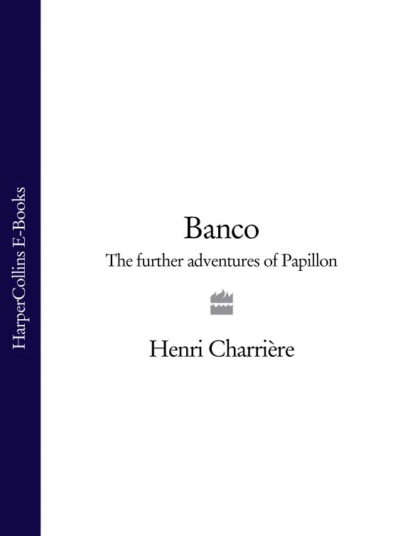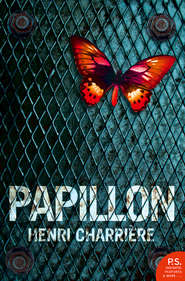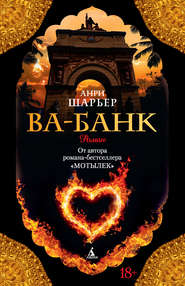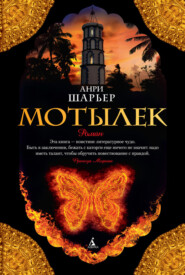По всем вопросам обращайтесь на: info@litportal.ru
(©) 2003-2025.
✖
Banco: The Further Adventures of Papillon
Настройки чтения
Размер шрифта
Высота строк
Поля
‘That doesn’t matter. I’ll fetch an ass for him. It’s a big house and there’s a negrita [a black girl], who’ll look after him like a mother.’
When we had found the second donkey we went to the girls’ house. Leaving these kind people was very painful. It was only when we promised we should come and see them and said they could come and see us at Caratal that they calmed down a little. I can never say too often how extraordinary it is, the Venezuelan Guianans’ hospitality. I was almost ashamed of myself when I left them.
Two hours later we were at Chariot’s ‘château’, as he called it. A big, light, roomy house on a headland looking out over the whole of the valley running down from the hamlet of Caratal almost to El Callao. On the right of this terrific virgin forest landscape was the Mocupia gold-mine. Chariot’s house was entirely built of hardwood logs from the bush: three bedrooms, a fine dining-room and a kitchen; two showers inside and one outside, in a perfectly kept kitchen-garden. All the vegetables we had at home were growing there, and growing well. A chicken-run with more than five hundred hens; rabbits, guinea-pigs, two goats and a pig. All this was the fortune and the present happiness of Chariot, the former hard guy and specialist in safes and very delicate operations worked out to the second.
‘Well, Papi, how do you like my shack? I’ve been here seven years. As I was saying in El Callao, it’s a far cry from Montmartre and penal! Who’d ever have believed that one day I’d be happy with such a quiet, peaceful life? What do you say, buddy?’
‘I don’t know, Chariot. I’m too lately out of stir to have a clear idea. For there’s no doubt about it, we’ve always been on the loose and our young days were uncommonly active! And then…it sets me back a little, seeing you quiet and happy here at the back of beyond. Yet you’ve certainly done it all yourself and I can see it must have meant a solid dose of hard labour, sacrifices of every kind. And as far as I am concerned, you see, I don’t feel myself up to it yet.’
When we were sitting round the table in the dining-room and drinking Martinique punch, Big Chariot went on, ‘Yes, Papillon, I can see you’re amazed. You caught on right away that I live by my own work. Eighteen bolivars a day means a small-time life, but it’s not without its pleasures. A hen that hatches me a good brood of chicks, a rabbit that brings off a big litter, a kid being born, tomatoes doing well…All these little things we despised for so long add up to something that gives me a lot. Hey, here’s my black girl. Conchita! Here are some friends of mine. He’s sick; you’ll have to look after him. This one’s called Enrique, or Papillon. He’s a friend from France, an old-time friend.’
‘Welcome to this house,’ said the black girl. ‘Don’t you worry, Chariot, your friends will be properly looked after. I’ll go and see to their room.’
Chariot told me about his break – an easy one. When he reached penal in the first place he was kept at Saint-Laurent-du-Maroni, and after six months he escaped from there with another Corsican called Simon and a detainee. ‘We were lucky enough to reach Venezuela a few months after the dictator Gomez died. These open-handed people helped us make a new life for ourselves. I had two years of compulsory residence at El Callao, and I stayed on. Little by little, I took to liking this simple life, you get it? I lost one wife when she was having a baby, and the daughter too. Then this black girl you’ve just seen, Conchita, she managed to comfort me with her real love and understanding, and she’s made me happy. But what about you, Papi? You must have had a cruelly hard time of it: thirteen years is a hell of a stretch. Tell me about it.’
I talked to this old friend for more than two hours, spilling out everything these last years had left rankling in me. It was a wonderful evening – wonderful for us both to be able to talk about our memories. It was odd, but there was not a single word about Montmartre, not a word about the underworld, no reminders of jobs that were pulled off or that misfired, nothing about crooks still at large. It was as though for us life had begun when we stepped aboard La Martinière, me in 1933, Chariot in 1935.
Excellent salad, a grilled chicken, goat cheese and a delicious mango, washed down with good Chianti and all put on the table by the cheerful Conchita, meant that Chariot could welcome me properly in his house and that pleased him. He suggested going down to the village for a drink. I said it was so pleasant here I didn’t want to go out.
‘Thanks, my friend,’ said my Corsican – he often put on a Paris accent. ‘You’re dead right: we are comfortable here. Conchita, you’ll have to find a girl-friend for Enrique.’
‘All right: Enrique, I’ll introduce you to friends prettier than me.’
‘You’re the prettiest of them all,’ said Chariot.
‘Yes, but I’m black.’
‘That’s the very reason why you’re so pretty, poppet. Because you’re a thoroughbred.’
Conchita’s big eyes sparkled with love and pleasure: it was easy to see she worshipped Chariot.
Lying quiedy in a fine big bed I listened to the BBC news from London on Chariot’s radio: but being plunged back into the life of the outside world worried me a little – I was not used to it any more. I turned the knob. Now it was Caribbean music that came through: Caracas in song. I did not want to hear the great cities urging me to live their life. Not this evening, anyway. I switched off quickly and began to think over the last few hours.
Was it on purpose we had not talked about the years when we both lived in Paris? No. Was it on purpose we had not mentioned the men of our world who had been lucky enough not to be picked up? No again. So did it mean that for tough guys like us what had happened before the trial no longer mattered?
I tossed and turned in the big bed. It was hot: I couldn’t bear it any more and I walked out into the garden. I sat down on a big stone, from where I was I looked out over the valley and the gold-mine. Everything was lit up down there. I could see trucks, empty or loaded, coming and going.
Gold: the gold that came out of the depths of that mine. If you had a lot of it, in bars or turned into notes, it would give you anything on earth. This prime mover of the world, that cost so little to mine, since the workers had such miserable wages, was the one thing you had to have to live well. And there was Chariot who had lost his freedom because he had wanted a lot of it: yet now he hadn’t even mentioned the stuff. He never told me whether the mine had plenty of gold in it or not. These days his happiness was his black girl, his house, his animals and his kitchen-garden. He had never even referred to money. He had become a philosopher. I was puzzled.
I remembered how they caught him – a guy by the name of Little Louis had tipped off the police; and during our short meetings in the Santé he never stopped swearing he would get him the first chance he had. Yet this evening he had not so much as breathed his name. And as for me – Christ, how strange! – I had not said a word about my cops, nor Goldstein, nor the prosecuting counsel, either. I ought to have talked about them! I hadn’t escaped just to end up as a cross between a gardener and a working-man.
I had promised to go straight in this country and I’d keep my word. But that didn’t mean I had given up my plans for revenge. Because you mustn’t forget, Papi, that the reason why you’re here today is not only that the idea of revenge kept you going for thirteen years in the cells but because it was your one religion too; and that religion is something you must never give up.
His little black girl was very pretty, all right; but still I wondered whether Big Chariot wouldn’t be better off in a city than in this hole at the far end of creation. Or maybe it was me who was the square, not seeing that my friend’s life had its charm. Or then again was it Chariot who was afraid of the responsibilities that modern big-town life would put upon him? That was something to chew over and reflect upon.
Chariot was forty-five, not an old man. Very tall, very strong, built like a Corsican peasant fed on plenty of good healthy food all his young days. He was deeply burnt by the sun of this country, and with his huge straw hat on his head, its brim turned up at the sides, he really looked terrific. He was a perfect example of the pioneer in these virgin lands, and he was so much one of the people and the country he did not stand out at all. Far from it: he really belonged.
Seven years he’d been here, this still-young Montmartre safe-breaker! He must certainly have worked more than two years to clear this stretch of plateau and build his house. He had to go out into the bush, choose the trees, cut them down, bring them back, fit them together. Every beam in his house was made of the hardest and heaviest timber in the world, the kind they call ironwood. I was sure all he earned at the mine had gone into it, because he must have had help and have paid for the labour, the cement (the house was concreted), the well and the windmill for pumping the water up to the tank.
That well-rounded young negrita with her big loving eyes: she must be a perfect companion for this old sea-dog on shore. I’d seen a sewing-machine in the big room. She must make those little dresses that suited her so well. Not many dressmaker’s bills for Chariot, no sir.
Maybe the reason why he hadn’t gone to the city was that he was not sure of himself, whereas here he enjoyed a life with no problems at all. You’re a great guy, Chariot! You’re the very picture of what a crook can be turned into. I congratulate you. But I also congratulate the people who helped you to change not only your life but even your way of seeing what a life can be or ought to be.
But still these Venezuelans are dangerous, with their generous hospitality. Being surrounded with human kindness and good will all the time soon turns you into a prisoner if you let yourself be caught. I’m free, free, free, and I mean to stay that way for ever.
Watch it, Papi! Above all, no setting up house with a girl. You need love when you’ve been cut off from it for so long. But fortunately I’d already had a girl in Georgetown two years ago, my Hindu, Indara. So from that point of view I was not so vulnerable as if I’d come straight from penal, which was the case with Chariot. Yet Indara was lovely and I was happy; but it wasn’t for that I had settled in Georgetown, living there in clover. Then again if the quiet life is too quiet, even though it’s happy, it’s not for me: that I know very well.
Adventure! Adventure so you feel alive, alive all through! Besides, that was why I left Georgetown and why I landed up at El Dorado. But that’s the reason too why I’m here today, in this very spot.
OK. Here the girls are pretty, full-blooded and charming and I certainly cannot live without love. It’s up to me to avoid complications. I must promise myself to stay here a year, since I’m forced to do so anyway. The less I own, the easier I’ll be able to leave this country and its enchanting people. I’m an adventurer, but an adventurer with a shift of gear – I must get my money honestly, or at least without hurting anyone. Paris, that is my aim: Paris one day, to present my bill to the people who put me through so much suffering.
I was calmer now, and my eyes took in the setting moon as it dipped towards the virgin forest, a sea of black tree-tops with waves of different heights – but waves that never stirred. I went back to my room and stretched out on the bed.
Paris, Paris, you’re still a great way off yet; but not so far that I shan’t be there again one day, walking the asphalt of your streets.
2: The Mine (#ulink_55b8e4ea-5eb9-54b4-aa2b-65d822791ffa)
A WEEK later, thanks to the letter that Prospéri, the Corsican grocer, wrote for me, I was taken on at the Mocupia mine. Here I was, looking after the working of the pumps that sucked up the water from the shafts.
The mine looked like a coal-pit: the same underground galleries. There were no veins of gold and very few nuggets. The gold was found in very hard rock: they blasted this rock with dynamite and then broke the oversized lumps with a sledge-hammer. The pieces were put into trucks, and the trucks came to the surface in lifts; then crushers reduced the rock to a powder finer than sand. This was mixed with water, making a liquid mud that was pumped up into huge tanks as big as the reservoirs in an oil-refinery: these tanks had cyanide in them. The gold dissolved into a liquid heavier than the rest and sank to the bottom. Under heat, the cyanide evaporated, carrying off the particles of gold; they solidified and were caught by filters very like combs as they went past. Then the gold was collected, melted into bars, carefully checked for 24-carat purity and put into a strictly guarded store. But who did the guarding? I still can’t get over it. Simon, no less, the hard guy who had made his break from penal with Big Chariot.
When my work was over, I went to gaze at the sight: I went to the store and stared at the huge pile of gold ingots neatly lined up by Simon, the ex-convict. Not even a strong-room: just a concrete store-house with walls no thicker than usual and a wooden door.
‘OK, Simon?’
‘OK. And what about you, Papi? Happy at Chariot’s?’
‘Yes, I’m fine.’
‘I never knew you were in El Dorado. Otherwise I’d have come to get you out.’
‘That’s civil. Are you happy here?’
‘Well, you know, I have a house: it’s not as big as Charlot’s, but it’s made of bricks and mortar. I built it myself. And I’ve got a young wife, very sweet. And two little girls. Come and see me whenever you like – my house is yours. Chariot tells me your friend is sick: now my wife knows how to give injections, so if you need her don’t hesitate.’
We talked. He too was thoroughly happy. He too never spoke of France or Montmartre, though he had lived there. Just like Chariot. The past no longer existed; the only thing that mattered was the present – wife, children, the house. He told me he earned twenty bolivars a day. Fortunately their hens gave them eggs for their omelettes and the chickens were on the house; otherwise they wouldn’t have gone far on twenty bolivars, Simon and his brood.
I gazed at that mass of gold lying there, so carelessly stored behind a wooden door and these four walls only a foot thick. A door that two heaves on a jemmy would open without a sound. This heap of gold, at three bolivars fifty the gramme or thirty-five dollars the ounce, would easily tot up to three million five hundred thousand bolivars or a million dollars. And this unbelievable great fortune was within hand’s reach! Knocking it off would be almost child’s play.
‘Elegant, my neat pile of ingots? Eh, Papillon?’
‘It’d be more elegant still well salted away. Christ, what a fortune!’
‘Maybe: but it’s not ours. It’s holy, on account of they’ve entrusted it to me.’
‘Entrusted it to you, sure; but not to me. You must admit it’s tempting to see something like that just lying about.’
‘It’s not just lying about, because I’m looking after it.’








